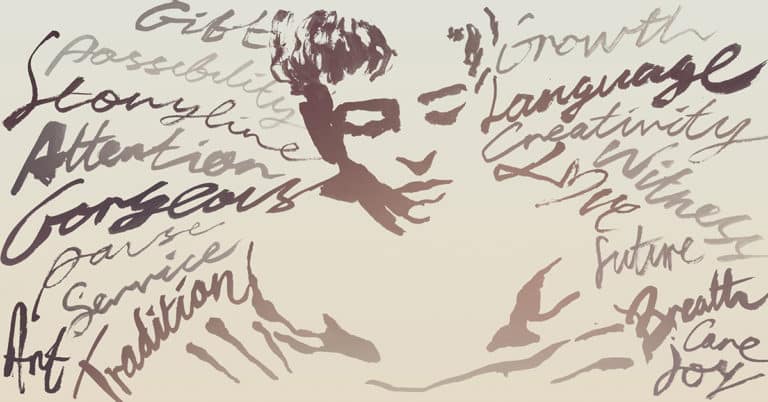Extras
Ocean Vuong
On Hope, Fire Escapes, and Visible Desperation
Fire escapes are a manifestation, the lyrical writer and thinker Ocean Vuong says, of the everpresent reality that “we are capable of disaster. And we are scared.” Could we learn to carry this more openly and honestly with each other? This is an excerpt from Ocean’s stunning live conversation with Krista in the immediate pre-pandemic days. He was full of prescient eloquence and wisdom, like the suggestion that we are called to be living lives “worthwhile of our breath” and asking what we would put in a vessel for the future “when the apocalypse comes.”
Listen to the full conversation here.
Transcript
Krista Tippett, host: You wrote this beautiful essay in The Rumpus in 2014, called “The Weight of Our Living: On Hope, Fire Escapes, and Visible Desperation.” Part of the context of that piece was your uncle’s death by suicide. He was three years older than you, and you’d grown up together. And that wove into you reflecting, on these walks you do through New York City, on fire escapes: you know, “All that richness and drama sealed away in a fortress whose walls echoed with communication of elemental and exquisite language” — you’re looking at all the buildings — “and yet only the fire escape, a clinging extremity, inanimate and often rusting, spoke — in its hardened, exiled silence with the most visible human honesty: We are capable of disaster. And we are scared.”
Ocean Vuong: It was such a blow. Anyone who has lost anybody to suicide — I lost my uncle; I lost a few friends. And the great mystery and the great violence of taking oneself out of the picture — I’ve been grappling with that for so long. And I think one of the things that lead us to that is that you start to feel that you are always out of the picture, this loneliness that language does not allow us to access. The way we say hello to each other — “Hi, how are you?” “Oh, good, good, good, good, good.” So the “how are you” is now defunct. It doesn’t access. It fills. It’s fluff. And so what happens to our language, this great, advanced technology that we’ve had, when it starts to fail at its function and it starts to obscure, rather than open. And I think the crisis my uncle went through, and a lot of my friends, was a crisis of communication — that they couldn’t say, “I’m hurt.”
And looking at — I remember, when I heard of his suicide, I was a student at Brooklyn College in New York. And I went for the longest walk. And I kept seeing these fire escapes. And I said, what happens if we had that? What is the linguistic existence of a fire escape, that we can give ourselves permission to say, “Are you really OK? I know we’re talking, but — you want to step out on the fire escape, and you can tell me the truth?” And I think we’ve built shame into vulnerability, and we’ve sealed it off in our culture — “Not at the table. Not at the dinner table. Don’t say this here. Don’t say that there. Don’t talk about this. This is not cocktail conversation,” what have you. We police access to ourselves. And the great loss is that we can move through our whole lives, picking up phones and talking to our most beloveds, and yet, still not know who they are. Our “how are you” has failed us. And we have to find something else.
And I thought about that. What if literature, my participation in it — that’s my field, if you will — what if the poem, the story, the novel, at its best, can serve as a fire escape? Because on the page, you don’t have the awkward reality of a body, bumping into someone in the supermarket. You don’t have to say, “How ‘bout them Patriots?” You don’t have to talk about the weather. You can go right in, deep. And I really have been — it changed the way I thought about writing and literature, in that if we have the fire escape as a reality in our buildings, what does it look like in the reality of our communication, in our language? What does that look like? I’m still figuring that out. I’m still — every book, every poem, I think, is my attempt at articulating a fire escape.
